14 Weird Games You’ll Obsess Over in 2025 (In the Best Way Possible)

Weird games hit different. They don’t play by the rules, and that’s exactly why I love them.
After sinking hours into some of the strangest stuff out there, I can tell you these offbeat titles leave way bigger impressions than most big-budget releases.
They’re awkward, funny, sometimes straight-up bizarre, but that’s the magic. These games throw out the usual formulas and go wild with creativity; you’re getting moments you’ll never forget.
So here’s my list of 14 weird games that are totally worth diving into.
Jump to:
Our Top Picks for Weird Games
I’ve played a ton of oddball games over the years, but a few stand out as the absolute kings of weird. These are the ones that had me grinning, confused, and completely hooked at the same time:
- The Stanley Parable (2013) – Nothing messes with your head like this one. A narrator follows you around, calling out every choice you make, and sometimes flat-out roasting you for ignoring him.
- Katamari Damacy Reroll (2018) – Rolling up paperclips, cows, cars, and eventually whole cities into one giant ball shouldn’t be this relaxing, but it is. Katamari is pure chaos, but it’s also weirdly chill.
- Keeper (2025) – The newest entry on this list and easily one of the strangest. You play as a walking lighthouse (yep, really) with a seagull sidekick, wandering through dreamlike worlds that feel straight out of someone’s fever dream.
That’s my short list of the weirdest of the weird. Now let’s dive into the full lineup and see just how strange games can get.
14 Weird Games That Redefine Gaming
I put this list together after sinking hours into these games, swapping stories with other players, and straight-up chasing the weirdest mechanics I could find. Replayability and pure strangeness; it’s all here.
1. The Stanley Parable [Most Meta Gaming Experience]

| Our Score | 10
☆
★
☆
★
☆
★
☆
★
☆
★
☆
★
☆
★
☆
★
☆
★
☆
★
|
| Type of game | Narrative adventure, walking simulator |
| Platforms | PC, PlayStation, Xbox, Nintendo Switch |
| Year of release | 2013 (Ultra Deluxe: 2022) |
| Creators | Galactic Cafe (Developer), Crows Crows Crows (Publisher) |
| Average playtime | 3-5 hours for main paths, 10+ hours for all endings |
| What I liked | The narrator’s dry British wit transforms every playthrough into a philosophical debate about free will and game design itself. |
The Stanley Parable flips gaming on its head. You’re Stanley, an office worker whose coworkers have all mysteriously vanished.
A smooth-talking narrator tries to guide you along, but the fun starts the moment you say “nah” and go off script. Every choice branches into stranger paths, from hilarious dead ends to full-on existential breakdowns of what a “game” even is.
The writing stays razor-sharp no matter how many times you play. Every run feels fresh, every “wrong” choice feels intentional, and the way it toys with player freedom makes you think while you laugh. It proves weird games don’t need to trade fun for brainy commentary.
It’s not the kind of game you finish – it’s one you poke at, over and over, just to see how wild things can get. The Ultra Deluxe edition only cranks this up; it adds new routes that mess with nostalgia and poke fun at sequels themselves.
I never thought wandering into a broom closet would feel as iconic as finding a secret ending, but here we are.
My verdict: The Stanley Parable is peak weird gaming. It still sparks debates years later, and with the Ultra Deluxe edition, it’s aged into something even more meta, fun, and endlessly replayable.
2. Katamari Damacy Reroll [Most Addictive Weird Concept]
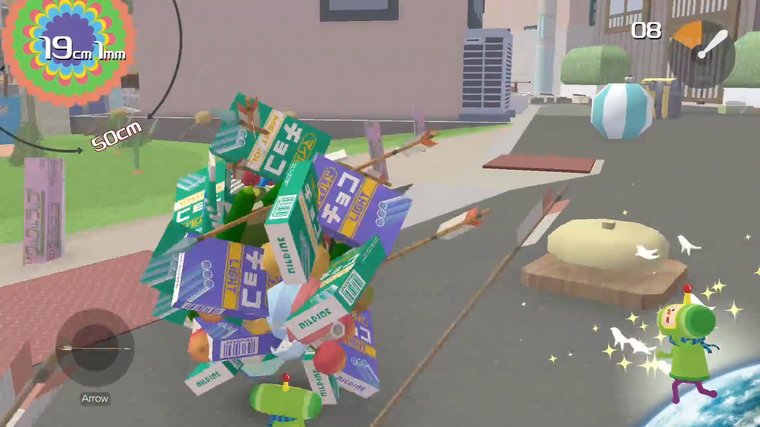
| Our Score | 9.5
☆
★
☆
★
☆
★
☆
★
☆
★
☆
★
☆
★
☆
★
☆
★
☆
★
|
| Type of game | Puzzle, action, third-person |
| Platforms | PC, PlayStation, Xbox, Nintendo Switch |
| Year of release | 2018 (Original: 2004) |
| Creators | Bandai Namco Entertainment |
| Average playtime | 5-7 hours for main story, 15+ hours for completionists |
| What I liked | Rolling up entire cities into massive balls satisfies a primal urge I didn’t know existed until I played this game. |
Katamari Damacy Reroll takes one ridiculous idea: rolling everything into a giant sticky ball, and somehow makes it genius. You play as the tiny Prince of All Cosmos, trying to fix the stars after your dad (the King of All Cosmos) wrecked them in one of his legendary screw-ups.
Armed with a Katamari, you start small with things like thumbtacks and snacks, but it doesn’t take long before you’re scooping up cats, cars, and eventually entire cities.
The loop is pure chaos in the best way. One moment you’re panicking because dogs are knocking you around, the next you’re steamrolling skyscrapers like it’s nothing.
This game shows how a bizarre concept can turn into something addictive. The jump from rolling tiny knick-knacks to swallowing continents never gets old, and its influence on quirky indie design still shows years later.
Each run forces you to think fast. You’ve got size goals and strict timers breathing down your neck, and the King doesn’t hold back on roasting you if you come up short. That mix of pressure and absurd humor gives the game real bite; you’ll be laughing while also plotting routes like it’s a strategy sim.
The soundtrack is an all-timer, full of J-pop bangers that make the madness feel almost zen. The art style? Bright, loud, and strange in a way that’s impossible to forget.
My verdict: Katamari Damacy Reroll is pure weird joy. It’s surreal and still feels as fresh now as it did in 2004.
3. Keeper [Best New Weird Game Release]
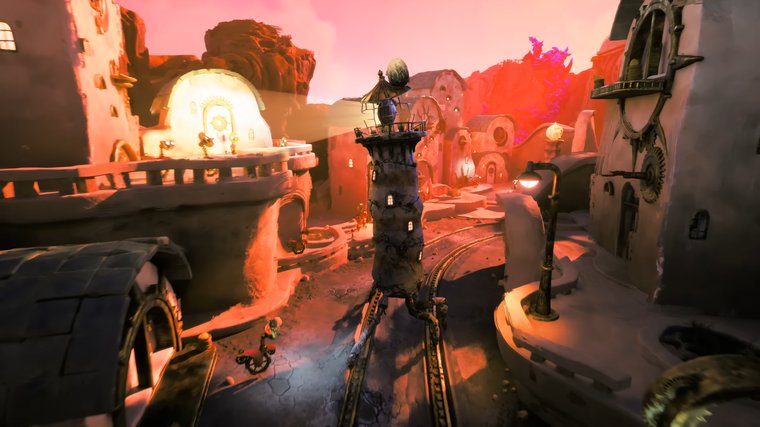
| Our Score | 9
☆
★
☆
★
☆
★
☆
★
☆
★
☆
★
☆
★
☆
★
☆
★
☆
★
|
| Type of game | Adventure, puzzle, atmospheric exploration |
| Platforms | PC (Steam) |
| Year of release | 2025 |
| Creators | Gearbox Publishing |
| Average playtime | 6-8 hours |
| What I liked | Playing as a sentient lighthouse creates the most emotionally resonant weird gaming experience I’ve had in years. |
Fresh out today, Keeper throws you into one of the strangest roles I’ve ever played: a walking lighthouse trekking through dreamlike landscapes. You’re not alone though, a cheeky little seabird tags along, and together you stumble across environments that constantly swing between stunning and unsettling.
The game never holds your hand, instead dropping cryptic clues and trusting you to piece the story together through its world and symbols.
Playing as a lighthouse feels heavy in a good way. Every step reminds you of the bulk you’re dragging around, and the light isn’t just for show. Shining beams cuts through the dark to reveal hidden paths, but it also works as a metaphor for hope fighting off despair.
The puzzles lean into that design; forget boring switches and levers, you’ll be solving problems that actually make sense for a body made of steel and light.
Keeper is what weird games should be about: a bizarre concept that changes how you play. The lighthouse’s body drives every mechanic, puzzle, and story beat, which proves weird ideas can carry serious emotional weight too.
The seabird companion steals the show in subtle ways. They don’t chatter or pull gimmicks, but their behavior shifts as you progress, building a bond that feels earned. Add in the ever-shifting environments (colors that soothe one moment then turn hostile the next) and you’ve got a game that keeps surprising you without a single word of forced exposition.
My verdict: Keeper is one of those games that’ll stick with you long after you finish it. It shows just how far “weird” can go when gameplay and storytelling click perfectly together.
4. Goat Simulator 3 [Best Physics Chaos]

| Our Score | 8.5
☆
★
☆
★
☆
★
☆
★
☆
★
☆
★
☆
★
☆
★
☆
★
☆
★
|
| Type of game | Action, sandbox, physics simulation |
| Platforms | PC, PlayStation, Xbox |
| Year of release | 2022 |
| Creators | Coffee Stain Studios |
| Average playtime | Coffee Stain Studios |
| What I liked | Goat Simulator 3 embraces glitches as features, creating the most liberating sandbox experience available. |
In Goat Simulator 3, you play as a goat with zero respect for physics and maximum appetite for mayhem. Here, bugs and ragdoll madness are the gameplay.
You can literally do whatever you want; launch yourself across rooftops, bounce off cars, or accidentally (on purpose) trigger chain reactions that leave the whole map in shambles. Every object feels like it’s waiting to betray logic and spark some ridiculous, meme-worthy moment.
The world’s bigger this time, and it actually pays to explore between wrecking sprees. Secret areas, collectibles, and odd little Easter eggs make wandering around worthwhile, while multiplayer cranks the nonsense into overdrive.
Few things beat teaming up with friends to cause synchronized goat chaos. On top of that, the customization is hilarious: your goat can morph into forms so absurd you’ll forget what “normal” even looks like.
Goat Simulator 3 shows that weird games don’t need to be highbrow to matter. Sometimes, leaning into dumb humor and broken physics creates the most genuine fun. It’s a game that celebrates imperfection and delivers laughs by letting go of the rules.
The quests themselves are jokes on gaming as a whole. Tutorials lie to you, fetch quests point out how pointless they are, and yet it all works because the game knows when to stop pushing. It’s less about structure, more about giving you a playground where your chaos is the story.
My verdict: Goat Simulator 3 is unapologetically stupid fun. It promises chaos in goat form, and that’s exactly what you get. It’s truly an unfiltered comedy that’s funnier the less you take it seriously.
5. Untitled Goose Game [Most Charming Chaos]

| Our Score | 9
☆
★
☆
★
☆
★
☆
★
☆
★
☆
★
☆
★
☆
★
☆
★
☆
★
|
| Type of game | Puzzle, stealth, comedy |
| Platforms | PC, PlayStation, Xbox, Nintendo Switch |
| Year of release | 2019 |
| Creators | House House |
| Average playtime | 3-4 hours for main story, 6+ hours for completionists |
| What I liked | Being a mischievous goose tormenting villagers shouldn’t be this satisfying, yet here we are. |
Untitled Goose Game puts you in the wings of a goose with one mission: ruin everyone’s day. Armed with nothing more than a honk, a grab, and a flappy strut, you turn a quiet village into your personal playground of chaos.
Well, it’s simple stealth at its core, but the humor comes from the context: stealing keys, trapping gardeners, or dragging someone’s prized lunch into a pond, just because you can.
Every new area adds layers to the prank list. What starts with small annoyances like nabbing a hat grows into elaborate, multi-step schemes that feel like puzzles in disguise. Pulling them off with your bare-bones move set feels oddly satisfying, because it’s all about timing and causing just enough trouble to watch humans scramble.
This game is how much fun minimalism can be. Untitled Goose Game took a bizarre idea and turned it into a mainstream hit, showing that weird design can charm millions if executed well. It’s approachable enough for casual players but still offers clever depth for puzzle fans, all while cementing the goose as a true internet legend.
The piano soundtrack makes every prank even funnier. Notes swell when villagers chase you, then mellow out as you waddle away smugly with their stuff. Add in the watercolor visuals that look like a storybook, and you’ve got this cozy aesthetic clashing perfectly with your goosey crimes.
My verdict: Untitled Goose Game is endlessly funny. It just focuses on pure mischief and sticks the landing perfectly.
6. Doki Doki Literature Club [Most Disturbing Surprise]

| Our Score | 8.5
☆
★
☆
★
☆
★
☆
★
☆
★
☆
★
☆
★
☆
★
☆
★
☆
★
|
| Type of game | Visual novel, psychological horror |
| Platforms | PC, PlayStation, Xbox, Nintendo Switch |
| Year of release | 2017 (Plus: 2021) |
| Creators | Team Salvato |
| Average playtime | 4-5 hours for main story, 8+ hours for Plus content |
| What I liked | This game weaponizes your expectations against you in ways that fundamentally changed how I approach visual novels. |
Doki Doki Literature Club tricks you right from the jump. It looks like a wholesome dating sim. You’re vibing with the characters, picking your favorite, and then… things start getting weird. Characters act off. Suddenly, you’re stuck in a horror story that’s coming straight for you.
That slow burn is what makes it hit so hard. At first, it’s little stuff you can shrug off, then it snowballs into full-on nightmare fuel. The game doesn’t just tell a spooky story; it uses you as part of it. The fourth-wall breaks feel like jump scares aimed at your brain. It’s unsettling in a way no movie or book could ever pull off, because your choices are the ammo.
This is one of those games that rewired how horror fans talk about the genre. Doki Doki Literature Club isn’t scary because of monsters or gore, it’s scary because it hijacks the rules of dating sims and turns them inside out. It’s smart and it proves that weird games can be way more effective than “safe” horror titles that stick to clichés.
The Plus edition drops side stories and bonus content that flesh out the cast without ruining what made the original so messed up. And yeah, the replay factor is nuts. Achievements, hidden dialogue, and secret events make every run feel different, so there’s always another layer waiting to mess with your head.
My verdict: Doki Doki Literature Club is essential if you wanna see just how far games can push psychological horror. It’ll stick in your brain long after you close the game.
7. Trombone Champ [Most Musically Absurd]
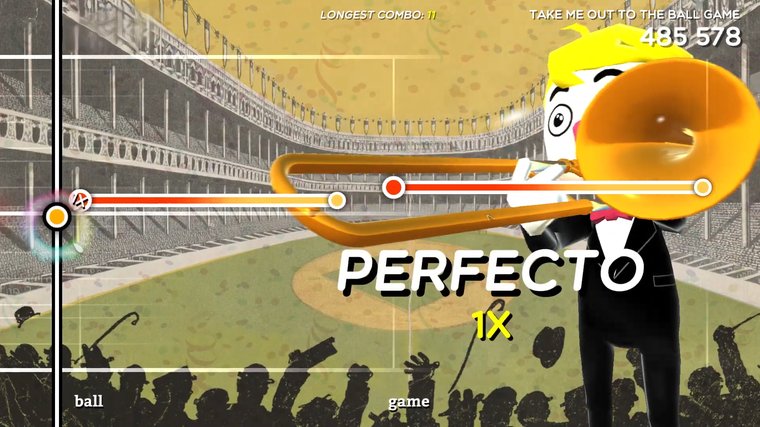
| Our Score | 8
☆
★
☆
★
☆
★
☆
★
☆
★
☆
★
☆
★
☆
★
☆
★
☆
★
|
| Type of game | Rhythm, music, comedy |
| Platforms | PC, Nintendo Switch |
| Year of release | 2022 |
| Creators | Holy Wow Studios |
| Average playtime | 3-5 hours for main content, 10+ hours for mastery |
| What I liked | Trombone Champ transforms rhythm games into comedy gold by making failure sound hilariously terrible. |
Most rhythm games treat mistakes like crimes; you miss a note, and you’re slapped with penalties until the track dies out in shame. Trombone Champ laughs at that idea. Here, you can butcher a song from start to finish, and the worse you play, the funnier it gets.
What makes it hit harder is how it controls. You’re not just mashing buttons like in Guitar Hero or Rock Band; you have to slide a cursor up and down to match pitch while timing your blows, which feels surprisingly close to wrangling a real trombone.
It’s messy, it’s chaotic, and the learning curve smacks you around until you stop trying to be precise and just start embracing the chaos. Honestly, the fun isn’t in mastery, it’s in sounding awful and owning it.
Trombone Champ went viral because it knows exactly what it is. It doesn’t water down the joke and it doesn’t try to be serious. It’s confident in the absurdity of “bad trombone sim,” and that commitment makes every session hysterical. I couldn’t stop laughing at how far it leans into its own bit.
On top of the core gameplay, you can unlock new trombones, goofy cosmetic tweaks, and collectible cards full of bizarre lore that’s just as unhinged as the soundtrack. The more you play, the weirder it gets, like the devs kept asking, “How much stranger can we make this?” and the answer is “Yes”.
My verdict: Trombone Champ is straight-up dumb fun, and I mean that in the best way. It’s not competing with polished rhythm games, it’s clowning on them by making failure the point.
8. Octodad: Dadliest Catch [Best Awkward Movement]

| Our Score | 8
☆
★
☆
★
☆
★
☆
★
☆
★
☆
★
☆
★
☆
★
☆
★
☆
★
|
| Type of game | Adventure, physics simulation, stealth |
| Platforms | PC, PlayStation, Xbox, Nintendo Switch |
| Year of release | 2014 |
| Creators | Young Horses |
| Average playtime | 3-4 hours for main story, 6+ hours for completionists |
| What I liked | Octodad’s commitment to making simple tasks monumentally difficult creates consistently funny gameplay moments. |
In Octodad: Dadliest Catch, you’re an octopus in a suit trying to live that suburban dad life, and somehow nobody notices the tentacles.
This game throws you into everyday tasks, but with physics controls that feel like wrestling spaghetti. Walking across the living room is a boss fight. Picking up a mug? Basically a raid mechanic. Every button press feels like you’re battling your own body, and that’s exactly where the comedy lands.
The best part is how the game turns the most boring chores into full-blown chaos. Grocery shopping feels like stealth mode in a survival horror game as you try not to wipe out entire displays. Flipping burgers at a barbecue is like juggling fire while pretending you’ve got it all under control.
Octodad nails the concept of making bad controls the whole point. The clumsiness is the feature, and it paved the way for tons of other physics-comedy games. What makes it stand out is how the chaos is wrapped around a story with real heart.
Underneath all the pratfalls and faceplants, there’s a sweet core. Octodad’s devotion to his family actually gives the game emotional weight. Between the supermarket flailing and tentacle BBQ disasters, there are touching beats about love, trust, and acceptance that sneak up on you.
My verdict: Octodad: Dadliest Catch is pure awkward comedy with a side of heart. I laughed, I flailed, I cared about a digital octopus dad more than I thought I would. That’s weird gaming done right.
9. My Friend Pedro [Most Stylish Violence]
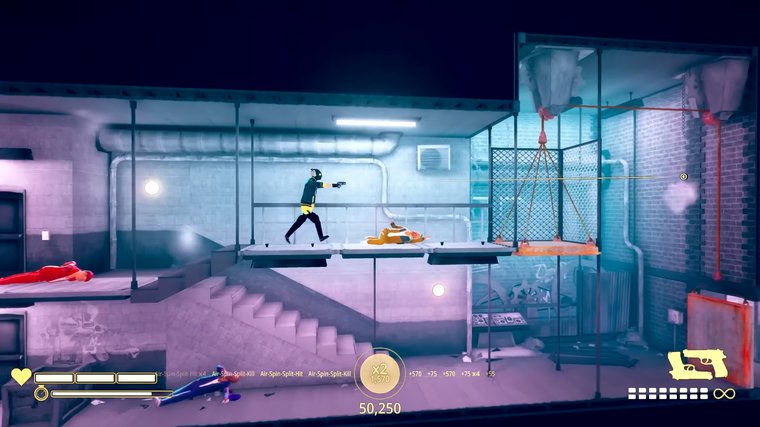
| Our Score | 8
☆
★
☆
★
☆
★
☆
★
☆
★
☆
★
☆
★
☆
★
☆
★
☆
★
|
| Type of game | Action, shooter, platformer |
| Platforms | PC, PlayStation, Xbox, Nintendo Switch |
| Year of release | 2019 |
| Creators | DeadToast Entertainment |
| Average playtime | 4-5 hours for main story, 8+ hours for high scores |
| What I liked | My Friend Pedro makes you feel like an action movie director choreographing impossible gun ballet sequences. |
You’ve got a talking banana whispering sweet chaos into your ear, and it’s glorious. My Friend Pedro takes the classic run-and-gun formula and cranks it up; it makes you feel like you’re filming your own action movie. You can just shoot your way through levels, sure, but the real fun comes from chaining combos so wild you’ll want to save the replay.
What hooked me was the way the scoring system pushes you to stop playing it safe. Keep the momentum rolling with non-stop kills, and you’ll rack up big points. Mess up the flow, and you’re back to feeling like a rookie.
On higher difficulties, every encounter feels like a rhythm game in disguise – miss a beat, and you’re toast. Replaying levels to beat my own scores turned into a whole addiction.
The talking banana sets the absurd tone, but the gunplay is what makes this game shine. Pedro proves weirdness works best when it amplifies rock-solid mechanics. The absurd humor gives you permission to go full John Wick on a skateboard, and the game’s confident enough in its design to let you be as stylish or reckless as you want.
The variety keeps you on your toes. One moment you’re clearing office corridors, then you’re blasting through sewers, then you’re in a motorcycle chase straight out of a blockbuster. By the time the dreamlike sequences kick in, you realize the game’s constantly reinventing itself, daring you to find new ways to break the rules.
My verdict: My Friend Pedro is pure style-over-substance; except the substance is damn good too. It’s the kind of weird action game that makes you want to replay levels just to see how insane you can get with the combos.
10. Jazzpunk [Most Surreal Weird Game Comedy]

| Our Score | 7.5
☆
★
☆
★
☆
★
☆
★
☆
★
☆
★
☆
★
☆
★
☆
★
☆
★
|
| Type of game | Adventure, comedy, first-person |
| Platforms | PC, PlayStation |
| Year of release | 2014 |
| Creators | Necrophone Games |
| Average playtime | 2-3 hours for main story, 4+ hours for all content |
| What I liked | Jazzpunk throws jokes at you with such density and absurdity that something always lands, even if you miss half the references. |
Jazzpunk drops you into a Cold War spy thriller, then immediately derails into pure chaos. Missions play out like an interactive sketch show, where every object and background gag is another punchline waiting to happen.
I’ve eaten radioactive pizza, played fake arcade games inside a mission, and stumbled into side quests that had nothing to do with espionage but made me laugh harder than the main objective.
The style is that mid-century vibe but twists it into a fever dream. Flat polygons, neon palettes, and deadpan voice acting all add to the surreal mood. The best part? The game never bothers to explain itself. You’re either along for the ride or completely lost, and that’s kind of the point. It wants you to embrace the nonsense and find humor in the confusion.
Jazzpunk is what happens when devs decide comedy comes first, gameplay second. It doesn’t care about mass appeal, and that confidence makes it legendary in the weird games scene. So many indies took notes from this – proving you can ignore conventions and still hit cult-classic status.
What I love most is how much freedom you get to goof off. Ignore the “mission” and wander into some side gag, and you’ll often find the funniest stuff tucked away. It rewards curiosity instead of efficiency, so no two players experience it the same. Comedians and speedrunners both have a field day here, just in totally different ways.
My verdict: Jazzpunk is comedy turned into a game cartridge. It’s ridiculous, confusing, and not built for everyone, but if you’re on its wavelength, you’ll have a blast unlike anything else.
11. I Am Bread [Most Frustrating Concept]
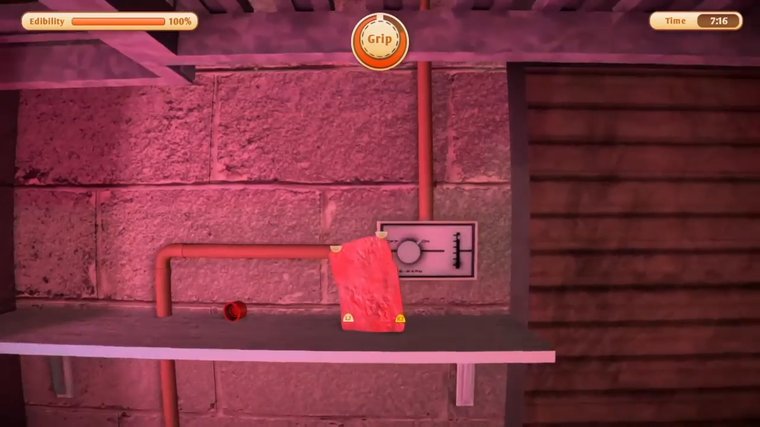
| Our Score | 7
☆
★
☆
★
☆
★
☆
★
☆
★
☆
★
☆
★
☆
★
☆
★
☆
★
|
| Type of game | Simulation, physics, puzzle |
| Platforms | PC, PlayStation, Xbox, Nintendo Switch, iOS |
| Year of release | 2015 |
| Creators | Bossa Studios |
| Average playtime | 4-6 hours for main story, 10+ hours for completionists |
| What I liked | I Am Bread transforms the mundane goal of becoming toast into a genuinely challenging physics puzzle that demands mastery. |
In I Am Bread, you’re not a hero, not a warrior, not even a goose… you’re a slice of bread with one dream: get toasted. Each corner of the bread is mapped to a button, so moving feels like playing QWOP on steroids.
Crossing a room turns into a nail-biter as you cling to counters, fling yourself across tables, and pray you don’t land butter-side down on the dirty floor. It sounds like a joke, but when you’re sweating over a windowsill jump, you realize this game means business.
The real kicker is the edibility meter. Every second counts. Touching mold, dragging across the floor, or just taking too long tanks your score. That pressure turns simple navigation into a high-stakes puzzle where every move matters. What starts out as comedy slowly mutates into a skill check that demands patience and more than a little luck.
I Am Bread goes way beyond being “haha, you’re bread.” The devs built a legit physics system with depth and progression, proving that a weird idea can work when it’s backed by solid mechanics. It forces you to think creatively about paths, risks, and movement while keeping the absurd premise intact.
Later levels shake things up with different bread types. Bagels roll like wheels, baguettes smack across the room with reach, and crackers shatter under pressure. Each twist forces you to unlearn habits and relearn the basics, which keeps the game fresh and brutally funny.
My verdict: I Am Bread is chaos disguised as carbs. It’s hilarious and way deeper than it has any right to be. If you can embrace the struggle, you’ll get a weirdly satisfying experience out of it.
12. Baby Steps [Most Deliberately Difficult]
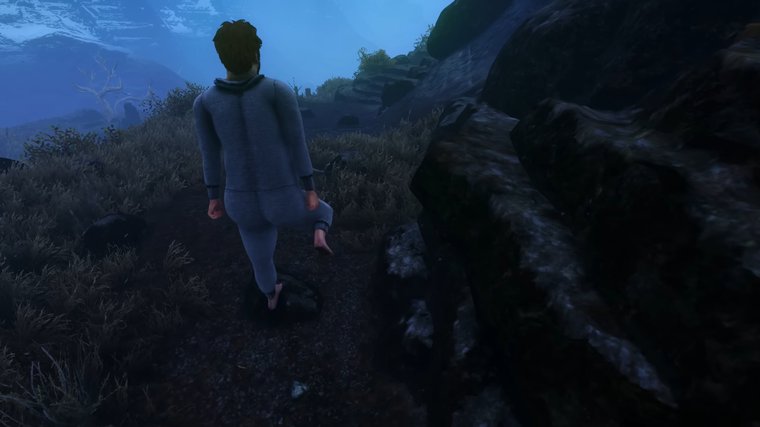
| Our Score | 7.5
☆
★
☆
★
☆
★
☆
★
☆
★
☆
★
☆
★
☆
★
☆
★
☆
★
|
| Type of game | Simulation, physics, party |
| Platforms | PC (Steam) |
| Year of release | 2024 |
| Creators | Bennett Foddy, Maxi Boch |
| Average playtime | 2-4 hours for main content, varies greatly by skill |
| What I liked | Baby Steps makes walking feel like climbing Mount Everest, and somehow that’s exactly the experience I needed. |
From Bennett Foddy, the mad genius behind QWOP and Getting Over It, comes another physics nightmare. In Baby Steps, you’re literally a grown man learning how to walk, and each leg is controlled with separate triggers. Moving forward feels like wrestling with gravity itself. Every step is a battle, and even making it across flat ground feels like beating a boss fight.
The magic here is that failing is just as fun as succeeding. Faceplanting every few seconds doesn’t feel punishing because, well, that’s exactly what a clumsy baby would do.
The slapstick comedy writes itself. When you finally manage a solid stride or somehow stumble up a hill, the pride hits harder than clearing a Souls boss. It’s the kind of game where progress is measured in inches but the laughs come nonstop.
Baby Steps nails Foddy’s philosophy of “controls as the enemy.” The frustrating physics aren the whole point, and the humor makes the grind worthwhile. It blew up on streams and YouTube because watching someone fall on their face a hundred times in a row is just as funny as doing it yourself.
Multiplayer adds another layer of chaos. Racing your buddies across simple courses turns into a circus of ragdoll bodies, awkward jumps, and constant wipeouts. It’s perfect for party nights or streaming, because the failure is the entertainment.
My verdict: Baby Steps is rage, comedy, and triumph rolled into one clumsy stumble. It’s not for everyone, but if you love games that make you laugh as much as they make you curse, this is peak weird gaming.
13. Squirrel With A Gun [Most Chaotic Freedom]

| Our Score | 7
☆
★
☆
★
☆
★
☆
★
☆
★
☆
★
☆
★
☆
★
☆
★
☆
★
|
| Type of game | Action, sandbox, comedy |
| Platforms | PC (Steam) |
| Year of release | 2024 |
| Creators | Dee Dee Creations |
| Average playtime | 4-6 hours for main content |
| What I liked | Squirrel With A Gun embraces its absurd premise fully, creating moments of pure chaos that justify the entire experience. |
You’re literally a squirrel who finds a gun. That’s the whole premise of Squirrel With A Gun, and somehow it works way better than it has any right to.
The gun isn’t just for blasting enemies either: the recoil launches your tiny squirrel body through the air, turning firefights into physics-based platforming. One second you’re popping off rounds at armed agents, the next you’re yeeting yourself across rooftops like a furry rocket. It’s stupid and it’s way too fun.
The neighborhood sandbox feels bigger than I expected. You can terrorize humans, swipe random objects, or just mess around with platforming challenges that reward creative movement.
It never forces you into one playstyle. If you want to min-max squirrel parkour, the movement tech supports it. If you’d rather just cause mayhem and watch NPCs lose their minds, the systems let you go full gremlin mode.
Squirrel With A Gun proves that a meme can become a legit game when the devs actually commit. It started as viral clips, but the full release packs real mechanics, upgrades, and weapon variety. Different guns change how you move, so picking your loadout is as much about mobility as damage. That extra layer makes it way more than a one-joke game.
The weapon pool is surprisingly stacked. Pistols, SMGs, and even heavier hardware all change how you fling yourself around. You start strategizing which gun gives the best recoil boost for traversal while still packing enough punch to deal with enemies. It’s equal parts comedy and creativity.
My verdict: Squirrel With A Gun is exactly what the title says, but it also proves it can stand on gameplay legs, not just memes. It’s silly, and somehow one of the most fun sandboxes I’ve played in ages.
14. Everything [Most Philosophical Sandbox]

| Our Score | 8
☆
★
☆
★
☆
★
☆
★
☆
★
☆
★
☆
★
☆
★
☆
★
☆
★
|
| Type of game | Simulation, exploration, philosophy |
| Platforms | PC, PlayStation, Xbox, Nintendo Switch |
| Year of release | 2017 |
| Creators | David OReilly |
| Average playtime | 3-5 hours for main content, potentially infinite |
| What I liked | Everything lets you experience existence from any perspective imaginable, creating profound philosophical moments between silly animal animations. |
In Everything, you start out as an animal, but within seconds you realize you can be anything. Tap a button and suddenly you’re a blade of grass. Shift again and you’re a molecule. Keep going and you’ll scale up to entire planets and galaxies.
The game lets you embody every possible thing in the universe, from ants to superclusters, and that constant perspective shift messes with your brain in the best way.
The experience leans into philosophy without ever forcing it down your throat. Alan Watts’ lectures play in the background as you explore, riffing on existence, consciousness, and the idea that everything is connected.
You might take it seriously and reflect on the big questions, or you might spend an hour making a giraffe ragdoll through space. Both approaches feel equally valid, and that’s part of the charm.
Everything balances playfulness and deep thought. It proves that a game can make you laugh one minute and leave you staring into space the next, just by letting you interact with its bizarre systems. Some players treat it like meditation software, others see it as a giant cosmic toybox, and both camps walk away with a memorable experience.
Procedural generation keeps the discoveries fresh. One run might have you bouncing from bacteria to whales, while another takes you from pebbles to planets. The variety makes it feel limitless, and the freedom to either chill or “collect” everything gives it surprising replay value.
My verdict: Everything is pure experimental gaming at its weirdest. It’s equal parts philosophy lecture and cosmic sandbox, and how much you get out of it depends entirely on what mindset you bring. Either way, it’s unforgettable.
My Overall Verdict on Weird Games Actually Worth Your Time
Weird games aren’t for everyone, but if you’re even a little curious, there’s a perfect starting point depending on your vibe. Some pull you in with comedy, others with philosophy, and a few just thrive on pure chaos. Here’s my take:
- For comedy lovers → Untitled Goose Game. Its stealth-meets-prank design turns everyday errands into slapstick puzzles that keep me laughing the whole way through.
- For action junkies → My Friend Pedro. The mix of bullet ballet and absurd banana commentary makes stylish kills feel just as important as survival.
- For chaos fans → Goat Simulator 3. Sometimes you just want to wreck stuff with friends, and nothing beats causing absolute mayhem as a ragdolling goat.
- For deep thinkers → Everything. This one shifts from silly to profound in seconds, where you can explore the universe as literally anything, all while tripping on big existential questions.
Weird games can be hilarious, frustrating, or even moving, but they all prove one thing: gaming’s strangest corners often hide the most unforgettable experiences.
FAQs
What makes a game “weird” is its refusal to follow conventional design rules, embracing strange mechanics, surreal aesthetics, or unpredictable storytelling. These games use experimentation and creativity to surprise players and redefine what gameplay can mean.
Weird games are worth playing even if you prefer traditional titles because they challenge your expectations and show how creative game design can be. Beneath their strange ideas often lie deep mechanics, emotional stories, and fun gameplay that anyone can enjoy.
The best weird game to play first with is The Stanley Parable, thanks to its simple controls and mind-bending storytelling that anyone can follow. If you want something lighter, Untitled Goose Game delivers pure mischief and charm without demanding skill or patience.
Weird games can absolutely be multiplayer, even if most are solo experiences at heart. Titles like Goat Simulator 3 and Baby Steps create hilarious chaos with friends, which also proves that absurdity is often better when shared.
Weird games can have strong replay value when their systems encourage experimentation or mastery. Games like Katamari Damacy and My Friend Pedro reward creativity and skill improvement, while story-heavy ones like The Stanley Parable reveal new paths over time.
Some weird games are appropriate for kids, especially those built around humor and lighthearted fun like Untitled Goose Game or Katamari Damacy. Others, such as Doki Doki Literature Club or My Friend Pedro, explore darker, mature themes best suited for adults.
Weird games often feature difficult controls because struggle is part of their design philosophy. Titles like Octodad and I Am Bread intentionally make movement awkward to turn frustration into comedy and engagement.
You can find more weird games on platforms like Eneba, Steam, Itch.io, and Epic Games Store. Keep an eye on events such as IndieCade and Fantastic Arcade, where developers showcase the next wave of experimental titles.















